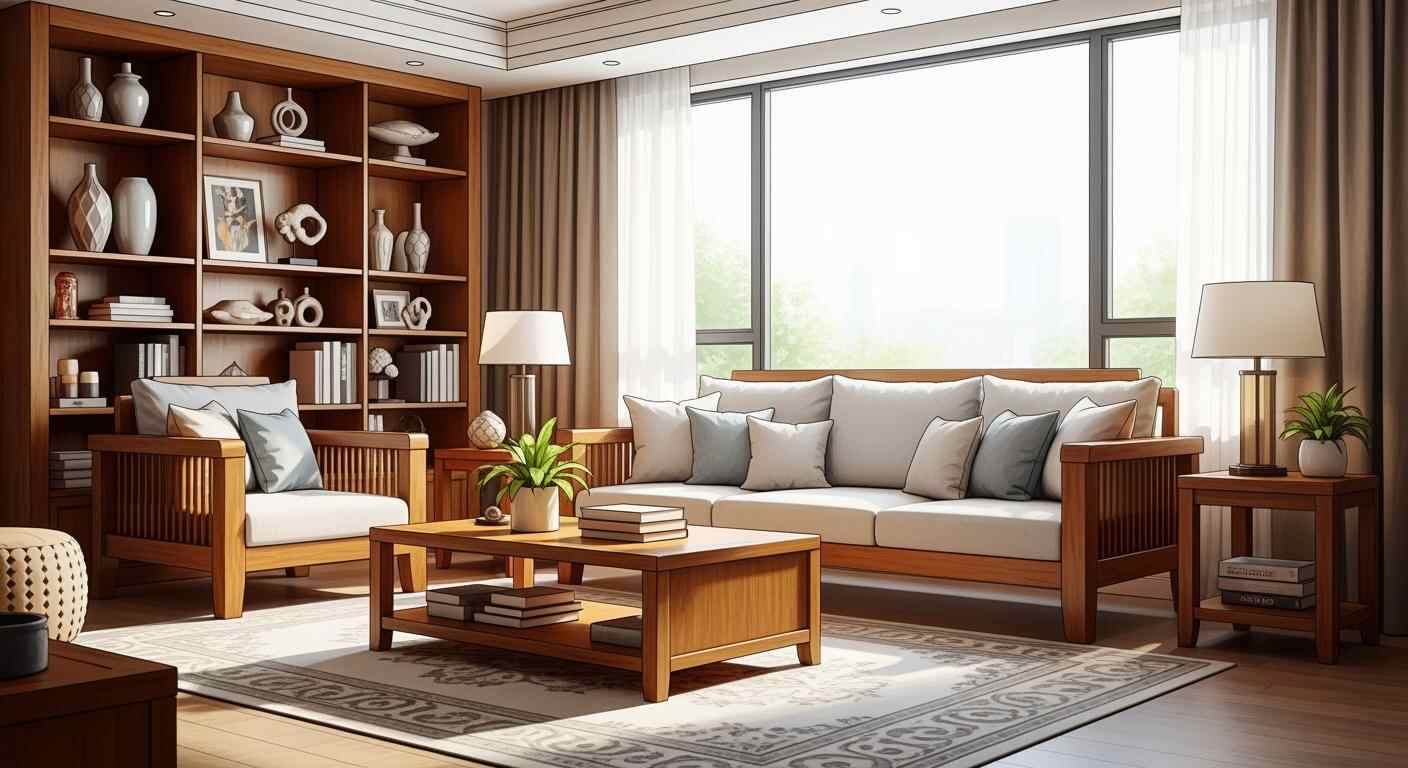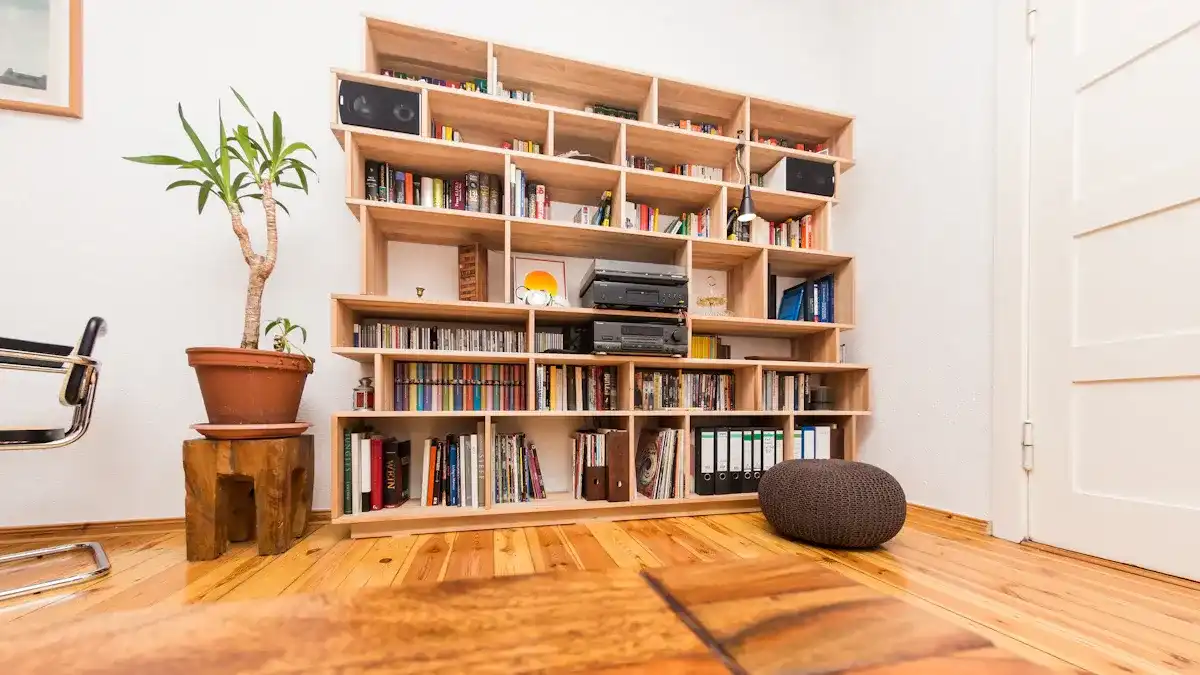Address
No.3 Chengcai Road, Leliu Town, Shunde District, Foshan City, Guangdong, China 528322
Address
No.3 Chengcai Road, Leliu Town, Shunde District, Foshan City, Guangdong, China 528322
Quality furniture offers lasting durability, comfort, and style. Learn how to choose pieces with strong materials and craftsmanship for your home.


Have you ever sat on a chair that wobbles after just a few months? Quality furniture stands out because it lasts for years, sometimes even decades. You get this strength from solid wood and careful craftsmanship. Skilled makers use sturdy joinery and pick the best materials, so you do not have to worry about warping or splitting. No matter your budget or style, you can find pieces that fit your home and give you peace of mind.
Quality furniture stays good for many years, sometimes 20-25 years. This helps you save money as time goes by.
Check for strong parts like solid wood and sturdy joints. Durable fabrics also help furniture last longer.
Mixing styles can make your room look better. Pick one color or material to make everything match.
Buy important pieces for rooms you use a lot. This gives you comfort and style without spending too much.
Take care of your furniture by dusting and looking for damage. This keeps it looking nice and helps it last longer.
When you look for quality furniture, you want pieces that last, feel sturdy, and look great in your home. You can spot these pieces by checking a few important features:
Makers use strong joints like dovetail, mortise-and-tenon, or dowels. These joints help keep your furniture stable for years.
Corner blocks in chairs and cabinets add extra strength, so you do not have to worry about wobbly legs or loose corners.
Screws and bolts hold parts together better than glue or staples.
The frame of a good sofa or chair uses kiln-dried hardwood. This wood does not warp or crack easily.
Quality sofas and chairs have sinuous springs or eight-way hand-tied springs. These springs give you better support and comfort.
Cushions made with high-density foam wrapped in down or polyester feel soft but keep their shape.
Durable fabrics like leather or heavy cotton blends work well in busy rooms.
A smooth, even finish with several layers of stain or varnish protects the surface and makes it look beautiful.
Solid metal hardware, like handles and hinges, shows attention to detail.
You might also notice some extra signs of quality:
Soft-close drawers and doors show that the maker cares about the small things.
Solid wood is stronger than veneer, but a good veneer over solid wood can also last a long time.
Top grain leather feels better and lasts longer than split hide leather.
Fully assembled furniture often means better construction than flat-pack pieces.
Many people think quality furniture always costs a lot or only comes in one style. That is not true. You can find great pieces at many price points and in styles from modern to classic. Stores like Pottery Barn, American Signature, and Baer’s offer a wide range of choices, so you can match your taste and budget.
You might also care about the environment. Some quality furniture uses bamboo, reclaimed wood, or organic fabrics. These materials are better for the planet and still look amazing. Makers who use non-toxic finishes and greener energy also help protect your health and the earth.
Choosing quality furniture makes a big difference in your home and your life. Here is why:
Aspect | Why It Matters |
|---|---|
Durability | A well-made sofa or table can last 20-25 years. Cheaper options may only last 5-7 years. |
Craftsmanship | Good brands test their furniture for strength and function. You get pieces that work well for a long time. |
Psychological benefits | Beautiful, sturdy furniture helps you feel proud of your space. It lets you show off your style. |
Economic advantages | You spend more at first, but you save money over time because you do not need to replace things as often. |
You might think all your furniture needs to match or that you should only focus on the furniture, not the whole room. That is a common mistake. Mixing styles can make your space feel more personal. Also, quality furniture does not always mean a high price tag. You can find strong, stylish pieces that fit your budget.
Sustainable furniture matters, too. When you pick pieces made from renewable or recycled materials, you help reduce waste. These pieces often last longer, so you do not need to throw them away as quickly. Some furniture can even be recycled or will break down naturally at the end of its life.
Tip: When you shop, look for labels that mention sustainable materials or non-toxic finishes. Ask about how the furniture was made and what goes into it.
Quality furniture gives you comfort, saves you money, and helps the planet. It is worth taking the time to choose pieces that fit your needs and values.

You can tell quality furniture by its materials. The best pieces use solid wood, strong metal, and good upholstery. These materials help furniture last longer and look nice for years. Here is a quick table showing some common materials and their benefits:
Material | Benefits |
|---|---|
Wood | Strong, looks classic, can be shaped, lasts many years. |
Metal | Does not burn, strong, light, stylish, great outside. |
Plastic | Cheap, can be used many ways, easy to clean, stands up to heat and wetness. |
Glass | Looks nice, makes rooms feel bigger, goes well with other materials. |
Some sofas have high-grade foam and springs. These help the sofa stay comfy and keep its shape for a long time. If you want furniture that lasts, always check what materials are used.
How furniture is made is just as important as the materials. Good construction means your table or chair will not wobble or break. Makers use strong joinery, like dovetail or mortise-and-tenon joints, to hold parts together. Screws and bolts make things even stronger.
Hardwoods like oak or maple make furniture last longer.
Strong joinery helps furniture stay together for years.
A smooth finish keeps away scratches and stains.
Tip: Always check the corners and joints. If they feel tight and strong, you have a well-made piece.
Design is not just about how furniture looks. It is also about how it works in your space. Good furniture mixes style and function. You want a chair that looks nice and feels good to sit in. Designers think about size, comfort, and how the piece fits in your room.
Good design means style and function work together.
Interior designers pick pieces that match your style and needs.
Both modern and classic styles can be high quality if they use good materials and smart building.
When you pick quality furniture, you get pieces that look good and work well at home.
When you walk into a furniture store, you want to spot the best pieces right away. Start by touching and lifting the furniture. Quality furniture feels heavy and balanced. It should not wobble or tip over easily. Open drawers and doors. They should glide smoothly and not make strange noises. Look at the finish. A good piece has a smooth, even surface with no bubbles or streaks.
Check the joinery. The way pieces connect tells you a lot. Here’s a quick guide:
What It Means for You | |
|---|---|
Mortise and Tenon | Strong, secure, and built to last |
Dovetail | Sturdy, with interlocking teeth for extra strength |
Dowels | Decent, but not as tough as the others |
You also want to see hardwoods like oak, cherry, or walnut. These woods last longer than softwoods or particle board.
Tip: Run your hand along the edges. If you feel rough spots or see uneven color, the maker may have rushed the job.
Don’t be shy about talking to the sales staff. Here are some smart questions you can ask:
What materials did you use to make this piece?
Does this come in other colors or fabrics?
What’s the warranty or guarantee?
How do I clean and care for this furniture?
Is assembly needed, and do you deliver?
Are there any sales or promotions soon?
Can you help me plan my room layout?
What is your return or exchange policy?
Can you tell me about the brand?
Are there financing options?
These questions help you learn more about the furniture and make sure it fits your needs.
Watch out for warning signs that a piece might not last. Here are some things to avoid:
Joints held together only by glue, staples, or nails
Crooked or rattling drawers and doors
Wobbly legs on chairs or tables
Bubbling or streaks in the finish
Thin veneers or laminate that can chip or splinter
Inconsistent wood grain or poorly fitting drawers
Red Flag | What It Means |
|---|---|
Poor Joinery | Weak and likely to break |
Hardware Issues | Sloppy work, may not last |
Wobbly Legs | Weak materials or bad construction |
Low-Quality Finish | Rushed job, may peel or chip |
If you spot these problems, keep looking. You deserve quality furniture that will last and look great in your home.
You want your home to feel comfortable and look great. Start by thinking about the atmosphere you want in each room. Do you like a modern look with clean lines and natural materials? Maybe you prefer a cozy space with warm colors. Decide on a color scheme or pick one material, like wood or metal, to tie everything together. Mixing styles works well if you keep a common color palette. Use statement pieces, like a bold chair or a unique table, to add interest. Make sure your furniture fits the room. If you have a small space, choose pieces that do not crowd the area. Balance the sizes of your furniture so the room feels open and welcoming.
Choose a color scheme for a unified look.
Mix styles, but keep one element the same, like material or color.
Add statement pieces for personality.
Check the size and shape of each piece to keep the room balanced.
Tip: Before you shop, picture how you want your room to feel. This helps you pick furniture that matches your style and needs.
Buying quality furniture does not mean you have to spend a fortune. Prices range from $135 to $8,600 or more, so you can find something for every budget. Set a budget that fits your home and lifestyle. Focus on key rooms, like your living room or bedroom, where comfort matters most. Invest in pieces made from strong materials. These last longer and save you money over time. If you buy cheap furniture, you might need to replace it often. For example, a cheap dresser may cost $300 and last three years. You could end up spending $1,200 over twelve years. A quality dresser for $900 can last twenty years, saving you money in the long run.
Set a budget based on your needs.
Prioritize important rooms.
Choose timeless designs and durable materials.
Plan your purchases over time to avoid buying low-quality items just to fill space.
You have many choices when shopping for furniture. Look for stores with good reputations and helpful staff. Crate and Barrel, Havertys, and Williams Sonoma Home offer a wide range of styles and prices. Research each retailer before you visit. Read reviews and ask friends for recommendations. Check if the store offers warranties or return policies. Visit showrooms to see and touch the furniture. This helps you spot quality pieces and make sure they fit your needs.
Store Name | What They Offer |
|---|---|
Crate and Barrel | Modern and classic styles |
Havertys | Affordable and durable options |
Williams Sonoma Home | High-end, timeless designs |
Note: Shopping at reputable stores gives you peace of mind and helps you find furniture that lasts.

You want your furniture to look great and last for years. Start with regular dusting using a soft cloth. This keeps dirt from building up. Keep your furniture away from direct sunlight and moisture. Sunlight can fade colors, and moisture can cause wood to warp or metal to rust. Use window shades or curtains to protect your pieces. Check your furniture often for signs of wear. Tighten loose screws and fix small problems before they get worse. Place protective covers on sofas and chairs if you have pets or kids. If you move your furniture, lift it instead of dragging to avoid damage. For deep cleaning or repairs, call a professional.
Tip: Set a reminder to inspect your furniture every few months. Small fixes now can save you big repairs later.
Different materials need different care. Here’s a quick guide to help you clean your furniture the right way:
Material | Cleaning Method |
|---|---|
Wood | Dust often, polish sometimes, clean spills right away. |
Metal | Dust, check for rust, use touch-up paint if needed. |
Cotton | Vacuum, use mild detergent, scrub gently, dry with a cloth. |
Velvet | Blot gently with solvent, use mild detergent for stains, dry completely. |
Polyester | Clean like cotton, use mild detergent. |
Leather | Use leather cleaner, condition after cleaning, treat spills quickly. |
Suede | Use special suede cleaner, avoid water, brush to clean. |
Always test any cleaner on a hidden spot first. For fabric, vacuum often and spot clean spills right away. For leather, dust and condition it to keep it soft. Never use harsh chemicals, as they can damage the finish.
You spend time and money choosing quality furniture, so protect it from damage. Clean up spills as soon as they happen to prevent stains. Keep your home at a steady humidity level. Too much moisture can cause mold, while dry air can crack wood. Use dehumidifiers or humidifiers if needed. Make sure your furniture has good airflow and stays dry. Place pieces away from water sources and use waterproof mats under plants. You can also apply protective treatments to fabrics and wood. Check your insurance to see if it covers furniture damage.
Note: Regular care keeps your furniture looking new and saves you money in the long run. Well-maintained pieces last longer and stay beautiful.
You now know what sets quality furniture apart. Look for strong materials, smart construction, and comfort. Here’s a quick guide:
Factor | What to Check For |
|---|---|
Durable fabrics for busy spaces | |
Solid wood or sturdy veneer | |
Construction | Strong joints like dovetail or mortise |
Comfort | Good support and feel |
Quality pieces last longer and feel better.
You save money over time.
Your home looks and feels great.
Take a moment to check your current furniture. Plan your next purchase with these tips in mind!
Touch the furniture. Feel for solid weight and smooth finishes. Check joints and corners. Open drawers and doors. They should move easily. Ask about the materials. If it feels sturdy and looks well-made, you probably found a quality piece.
No, you can find strong, stylish furniture at many price points. Look for sales or shop at trusted stores. Sometimes, spending a little more saves you money because you won’t need to replace things as often.
Solid wood, metal, and top-grain leather last the longest. These materials resist wear and tear. You get better value over time. Avoid thin veneers and cheap plastics if you want furniture that stays strong.
Dust regularly with a soft cloth. Clean spills right away. Keep furniture out of direct sunlight. Use gentle cleaners for wood and fabric. Tighten screws and check for loose parts. Small steps help your furniture stay beautiful.
Yes! Mixing styles adds personality to your space. Use a common color or material to tie everything together. Try pairing a modern sofa with a classic table. Your room will feel unique and inviting.